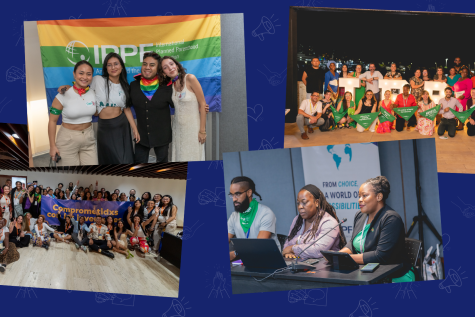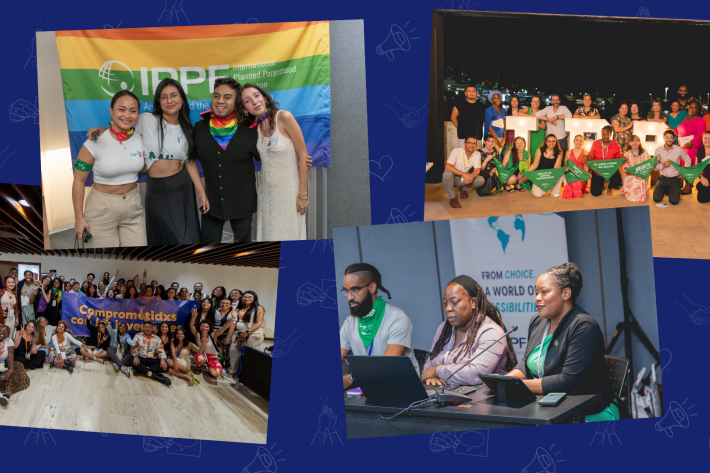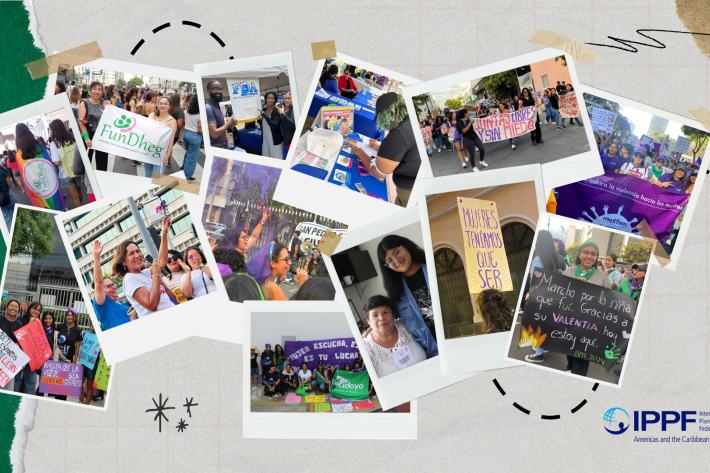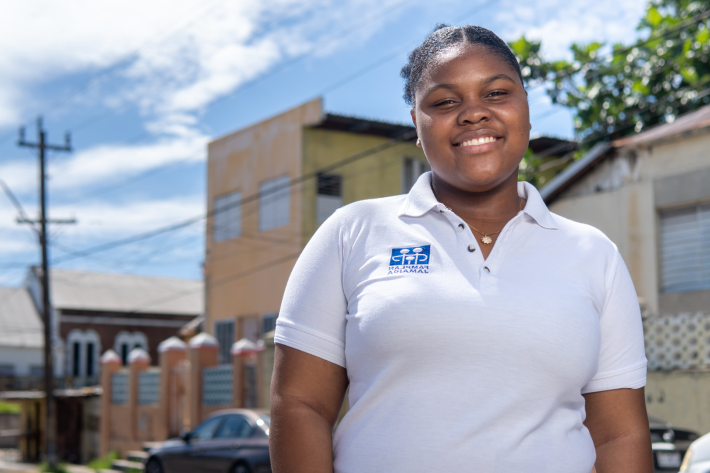Spotlight
A selection of stories from across the Federation

SRHR after Cartagena: the Pending Agenda for Population and Development
Our key highlights of the Conference on Population and Development 2024
Most Popular This Week
Brazil

The High-Level Political Forum: Let’s rewrite the rules
Haz click aquí para leer esta historia en español. The High-Level Political Foru

SRHR after Cartagena: the Pending Agenda for Population and Development
Haz click aquí para leer esta historia en espa
Americas & the Caribbean

Trinidad and Tobago, Colombia, St Lucia

Revolutionizing CSE: Latin American and Caribbean Youth Leading the Charge!
Revolutionizing CSE: Latin American and Caribbean Youth Leading the Charge!
Jamaica

I’ve seen people become more aware and more careful.
Candice Taylor, 18, joined the Jamaica Family Planning Association (JFPA) Youth Advocacy Movement (YAM) at age 15 after youth officer Fiona Francis introduced her to the group.
Filter our stories by:


| 30 July 2024
SRHR after Cartagena: the Pending Agenda for Population and Development
Haz click aquí para leer esta historia en español. From June 30th to July 4th, fifteen Member Associations and Collaborative partners joined IPPF ACRO secretariat as a delegation to attend the 5th Regional Conference on Population and Development of Latin America and the Caribbean (RCPD). The RCPD brought together regional UN Member States, representatives of the UN system and civil society organizations to evaluate achievements and challenges in the implementation of the Montevideo Consensus, a regional roadmap essential to achieve the Sustainable Development Goals (SDGs). In our region, IPPF has been following up the Population and Development agenda through Cairo +30 as well as the Montevideo Consensus +10, advocating for more concrete progress at national, regional and international levels, including demanding adequate financing and accountability processes. For IPPF ACRO, following up on the Population and Development agenda means also advocating for legislative changes that support sexual and reproductive rights. This goes hand in hand with monitoring public policies to ensure that national and subnational governments provide sexual and reproductive health services that are available, accessible, acceptable, and of high quality. This year, the IPPF ACRO delegation was comprised of representatives of Member Associations and Collaborative Partners in Antigua, Argentina, Bolivia, Brazil, Colombia, Dominica, Ecuador, Grenada, Guatemala, Honduras, Jamaica, Mexico, Peru, St. Lucia, and Trinidad and Tobago, as well as a regional office team with Eugenia López Uribe, our regional director, Kamilah Morain, MA Support and Development Director, Ela Urquijo, Youth Networker and Gabriela García, Architect of Cooperation for the Americas. Together we organized three side events and for the first time, we endeavored in an Advocacy School for Youth, in collaboration with Profamilia and FP2030, aiming to strengthen their advocacy skills. Besides, since historically, the Caribbean region has been left aside from high-level spaces in our region, IPPF ACRO showed in Cartegena its commitment to changing the landscape “Because of the dynamic nature of the Caribbean, it is extremely important to have the Caribbean represented in forums like the RCPD,” says Natasha Jervier-Carbon, Executive Director of the Dominica Planned Parenthood Association (DPPA), IPPF Member. “The only way the Caribbean can be truly reflected is by having the actual presence of the Caribbean in the spaces and allowing individuals who live the life, and who understand the nature of the Caribbean to speak on behalf of the Caribbean.”

| 15 July 2024
SRHR after Cartagena: the Pending Agenda for Population and Development
Haz click aquí para leer esta historia en español. From June 30th to July 4th, fifteen Member Associations and Collaborative partners joined IPPF ACRO secretariat as a delegation to attend the 5th Regional Conference on Population and Development of Latin America and the Caribbean (RCPD). The RCPD brought together regional UN Member States, representatives of the UN system and civil society organizations to evaluate achievements and challenges in the implementation of the Montevideo Consensus, a regional roadmap essential to achieve the Sustainable Development Goals (SDGs). In our region, IPPF has been following up the Population and Development agenda through Cairo +30 as well as the Montevideo Consensus +10, advocating for more concrete progress at national, regional and international levels, including demanding adequate financing and accountability processes. For IPPF ACRO, following up on the Population and Development agenda means also advocating for legislative changes that support sexual and reproductive rights. This goes hand in hand with monitoring public policies to ensure that national and subnational governments provide sexual and reproductive health services that are available, accessible, acceptable, and of high quality. This year, the IPPF ACRO delegation was comprised of representatives of Member Associations and Collaborative Partners in Antigua, Argentina, Bolivia, Brazil, Colombia, Dominica, Ecuador, Grenada, Guatemala, Honduras, Jamaica, Mexico, Peru, St. Lucia, and Trinidad and Tobago, as well as a regional office team with Eugenia López Uribe, our regional director, Kamilah Morain, MA Support and Development Director, Ela Urquijo, Youth Networker and Gabriela García, Architect of Cooperation for the Americas. Together we organized three side events and for the first time, we endeavored in an Advocacy School for Youth, in collaboration with Profamilia and FP2030, aiming to strengthen their advocacy skills. Besides, since historically, the Caribbean region has been left aside from high-level spaces in our region, IPPF ACRO showed in Cartegena its commitment to changing the landscape “Because of the dynamic nature of the Caribbean, it is extremely important to have the Caribbean represented in forums like the RCPD,” says Natasha Jervier-Carbon, Executive Director of the Dominica Planned Parenthood Association (DPPA), IPPF Member. “The only way the Caribbean can be truly reflected is by having the actual presence of the Caribbean in the spaces and allowing individuals who live the life, and who understand the nature of the Caribbean to speak on behalf of the Caribbean.”

| 11 August 2021
“At BFPA, we don’t turn away anyone”
Keriann Hurley has worked at the Barbados Family Planning Association (BFPA) for 15 years. She is a social worker and the Manager of Youth Programming, but art is another passion of hers. A link between art and social work may not seem evident but Keriann explains that combining her passions “helps to fuel the type of interventions I do with the clients.” Keriann is proud that “here at BFPA, our niche and the thing that we do amazingly well, above anyone else I dare say, is how we deal with Sexual and Reproductive Health issues, but that’s not all we do”. “Sexuality and sexual health is only one aspect of your existence”, she says. She is clear that BFPA’s services must consider gender, sexual identity, sexual orientation, mental health, family circumstances and relationships in its service delivery if it is to truly serve the community. There is a real need to provide unhindered access to young people who require services In Barbados, the age of consent is 16 but “there is still the issue of the age of access versus the age of consent.” Keriann explained that there’s no legal framework that prevents young people between 16 and 18 from accessing SRH services; there is the cultural “assumption that they must bring parent/guardian to be seen by a medical professional.” “A young person isn’t just going to show up at a doctor’s office because they think it’s the cool thing to do. There must be a dire reason”, Keriann says, and she adds that many young people do not access services because they fear judgement and punishment. “At BFPA, we don’t turn away anyone” A key task of the BFPA is to facilitate young people’s access to SRH services. BFPA established legally compliant protocols which govern their engagement with young people. Social Workers like Keriann comprehensively assess the personal circumstances of each young person to ensure that they are provided with the appropriate care. “Not every young person has a parent or guardian who will come with them, but should they be turned away if they have a dire need? No, it’s unethical to do that. At BFPA, we don’t turn away anyone”, she says. Sometimes a young person does have an available parent or guardian but fears their reaction to their desire to access SRH services. In these situations, she acts as a mediator to facilitate conversation between the young person and their caretaker. With the years passing, it became clear to Keriann that the challenge is “dealing with age-old issues in new ways. There is nothing new under the sun. However, issues do come back around in new ways”. The significance of certain issues changes with the times. “Just look at social media!” she says, “it also means that information, and misinformation, is easily accessible.” Keriann has seen a shift in societal attitudes towards SRH over the last 5 years. A plus side of the internet, she says, is that the accessibility of information means that society cannot “bury its head in the sand and pretend that young people aren’t sexually exploring.” “The Young Mothers Programme is my baby” In 2011, Keriann started this 10-year programme. The majority of Barbadian households are female-headed and she recognises that empowering young mothers will have a powerful positive impact on society. “These girls come with heavy issues,” Keriann says. Beneficiaries are taught not just parenting skills but life skills. They have access to intensive psychosocial counselling for themselves, partners and family members and vocational training. The Young Mothers Programme has transitioned to online delivery which poses such as lack of devices, electricity or a conducive household environment, and unreliability or absence of internet access. “Suddenly there was a new normal before we could even figure out what that meant”, Keriann says. Online delivery is more tiring, and she admits the difficulty in balancing delivery of a quality programme without an unsustainable psychological cost to herself but is adamant that “it is better to have a meaningful impact on 10 people than surface level engagement with 100”. Keriann believes that “the wealth and health of a society is based on how we take care of the most vulnerable. Working in an organisation whose focus is primarily the most vulnerable is really rewarding”. Keriann shares that social work is one of least financially viable careers in Barbados. “Many months we just try to get by, but the work is really rewarding!” she laughed, “We are here grinding on and doing what we have to do to make sure that we provide quality services to the most vulnerable in our community and not leaving anyone behind”

| 09 May 2025
“At BFPA, we don’t turn away anyone”
Keriann Hurley has worked at the Barbados Family Planning Association (BFPA) for 15 years. She is a social worker and the Manager of Youth Programming, but art is another passion of hers. A link between art and social work may not seem evident but Keriann explains that combining her passions “helps to fuel the type of interventions I do with the clients.” Keriann is proud that “here at BFPA, our niche and the thing that we do amazingly well, above anyone else I dare say, is how we deal with Sexual and Reproductive Health issues, but that’s not all we do”. “Sexuality and sexual health is only one aspect of your existence”, she says. She is clear that BFPA’s services must consider gender, sexual identity, sexual orientation, mental health, family circumstances and relationships in its service delivery if it is to truly serve the community. There is a real need to provide unhindered access to young people who require services In Barbados, the age of consent is 16 but “there is still the issue of the age of access versus the age of consent.” Keriann explained that there’s no legal framework that prevents young people between 16 and 18 from accessing SRH services; there is the cultural “assumption that they must bring parent/guardian to be seen by a medical professional.” “A young person isn’t just going to show up at a doctor’s office because they think it’s the cool thing to do. There must be a dire reason”, Keriann says, and she adds that many young people do not access services because they fear judgement and punishment. “At BFPA, we don’t turn away anyone” A key task of the BFPA is to facilitate young people’s access to SRH services. BFPA established legally compliant protocols which govern their engagement with young people. Social Workers like Keriann comprehensively assess the personal circumstances of each young person to ensure that they are provided with the appropriate care. “Not every young person has a parent or guardian who will come with them, but should they be turned away if they have a dire need? No, it’s unethical to do that. At BFPA, we don’t turn away anyone”, she says. Sometimes a young person does have an available parent or guardian but fears their reaction to their desire to access SRH services. In these situations, she acts as a mediator to facilitate conversation between the young person and their caretaker. With the years passing, it became clear to Keriann that the challenge is “dealing with age-old issues in new ways. There is nothing new under the sun. However, issues do come back around in new ways”. The significance of certain issues changes with the times. “Just look at social media!” she says, “it also means that information, and misinformation, is easily accessible.” Keriann has seen a shift in societal attitudes towards SRH over the last 5 years. A plus side of the internet, she says, is that the accessibility of information means that society cannot “bury its head in the sand and pretend that young people aren’t sexually exploring.” “The Young Mothers Programme is my baby” In 2011, Keriann started this 10-year programme. The majority of Barbadian households are female-headed and she recognises that empowering young mothers will have a powerful positive impact on society. “These girls come with heavy issues,” Keriann says. Beneficiaries are taught not just parenting skills but life skills. They have access to intensive psychosocial counselling for themselves, partners and family members and vocational training. The Young Mothers Programme has transitioned to online delivery which poses such as lack of devices, electricity or a conducive household environment, and unreliability or absence of internet access. “Suddenly there was a new normal before we could even figure out what that meant”, Keriann says. Online delivery is more tiring, and she admits the difficulty in balancing delivery of a quality programme without an unsustainable psychological cost to herself but is adamant that “it is better to have a meaningful impact on 10 people than surface level engagement with 100”. Keriann believes that “the wealth and health of a society is based on how we take care of the most vulnerable. Working in an organisation whose focus is primarily the most vulnerable is really rewarding”. Keriann shares that social work is one of least financially viable careers in Barbados. “Many months we just try to get by, but the work is really rewarding!” she laughed, “We are here grinding on and doing what we have to do to make sure that we provide quality services to the most vulnerable in our community and not leaving anyone behind”

| 30 July 2024
SRHR after Cartagena: the Pending Agenda for Population and Development
Haz click aquí para leer esta historia en español. From June 30th to July 4th, fifteen Member Associations and Collaborative partners joined IPPF ACRO secretariat as a delegation to attend the 5th Regional Conference on Population and Development of Latin America and the Caribbean (RCPD). The RCPD brought together regional UN Member States, representatives of the UN system and civil society organizations to evaluate achievements and challenges in the implementation of the Montevideo Consensus, a regional roadmap essential to achieve the Sustainable Development Goals (SDGs). In our region, IPPF has been following up the Population and Development agenda through Cairo +30 as well as the Montevideo Consensus +10, advocating for more concrete progress at national, regional and international levels, including demanding adequate financing and accountability processes. For IPPF ACRO, following up on the Population and Development agenda means also advocating for legislative changes that support sexual and reproductive rights. This goes hand in hand with monitoring public policies to ensure that national and subnational governments provide sexual and reproductive health services that are available, accessible, acceptable, and of high quality. This year, the IPPF ACRO delegation was comprised of representatives of Member Associations and Collaborative Partners in Antigua, Argentina, Bolivia, Brazil, Colombia, Dominica, Ecuador, Grenada, Guatemala, Honduras, Jamaica, Mexico, Peru, St. Lucia, and Trinidad and Tobago, as well as a regional office team with Eugenia López Uribe, our regional director, Kamilah Morain, MA Support and Development Director, Ela Urquijo, Youth Networker and Gabriela García, Architect of Cooperation for the Americas. Together we organized three side events and for the first time, we endeavored in an Advocacy School for Youth, in collaboration with Profamilia and FP2030, aiming to strengthen their advocacy skills. Besides, since historically, the Caribbean region has been left aside from high-level spaces in our region, IPPF ACRO showed in Cartegena its commitment to changing the landscape “Because of the dynamic nature of the Caribbean, it is extremely important to have the Caribbean represented in forums like the RCPD,” says Natasha Jervier-Carbon, Executive Director of the Dominica Planned Parenthood Association (DPPA), IPPF Member. “The only way the Caribbean can be truly reflected is by having the actual presence of the Caribbean in the spaces and allowing individuals who live the life, and who understand the nature of the Caribbean to speak on behalf of the Caribbean.”

| 15 July 2024
SRHR after Cartagena: the Pending Agenda for Population and Development
Haz click aquí para leer esta historia en español. From June 30th to July 4th, fifteen Member Associations and Collaborative partners joined IPPF ACRO secretariat as a delegation to attend the 5th Regional Conference on Population and Development of Latin America and the Caribbean (RCPD). The RCPD brought together regional UN Member States, representatives of the UN system and civil society organizations to evaluate achievements and challenges in the implementation of the Montevideo Consensus, a regional roadmap essential to achieve the Sustainable Development Goals (SDGs). In our region, IPPF has been following up the Population and Development agenda through Cairo +30 as well as the Montevideo Consensus +10, advocating for more concrete progress at national, regional and international levels, including demanding adequate financing and accountability processes. For IPPF ACRO, following up on the Population and Development agenda means also advocating for legislative changes that support sexual and reproductive rights. This goes hand in hand with monitoring public policies to ensure that national and subnational governments provide sexual and reproductive health services that are available, accessible, acceptable, and of high quality. This year, the IPPF ACRO delegation was comprised of representatives of Member Associations and Collaborative Partners in Antigua, Argentina, Bolivia, Brazil, Colombia, Dominica, Ecuador, Grenada, Guatemala, Honduras, Jamaica, Mexico, Peru, St. Lucia, and Trinidad and Tobago, as well as a regional office team with Eugenia López Uribe, our regional director, Kamilah Morain, MA Support and Development Director, Ela Urquijo, Youth Networker and Gabriela García, Architect of Cooperation for the Americas. Together we organized three side events and for the first time, we endeavored in an Advocacy School for Youth, in collaboration with Profamilia and FP2030, aiming to strengthen their advocacy skills. Besides, since historically, the Caribbean region has been left aside from high-level spaces in our region, IPPF ACRO showed in Cartegena its commitment to changing the landscape “Because of the dynamic nature of the Caribbean, it is extremely important to have the Caribbean represented in forums like the RCPD,” says Natasha Jervier-Carbon, Executive Director of the Dominica Planned Parenthood Association (DPPA), IPPF Member. “The only way the Caribbean can be truly reflected is by having the actual presence of the Caribbean in the spaces and allowing individuals who live the life, and who understand the nature of the Caribbean to speak on behalf of the Caribbean.”

| 11 August 2021
“At BFPA, we don’t turn away anyone”
Keriann Hurley has worked at the Barbados Family Planning Association (BFPA) for 15 years. She is a social worker and the Manager of Youth Programming, but art is another passion of hers. A link between art and social work may not seem evident but Keriann explains that combining her passions “helps to fuel the type of interventions I do with the clients.” Keriann is proud that “here at BFPA, our niche and the thing that we do amazingly well, above anyone else I dare say, is how we deal with Sexual and Reproductive Health issues, but that’s not all we do”. “Sexuality and sexual health is only one aspect of your existence”, she says. She is clear that BFPA’s services must consider gender, sexual identity, sexual orientation, mental health, family circumstances and relationships in its service delivery if it is to truly serve the community. There is a real need to provide unhindered access to young people who require services In Barbados, the age of consent is 16 but “there is still the issue of the age of access versus the age of consent.” Keriann explained that there’s no legal framework that prevents young people between 16 and 18 from accessing SRH services; there is the cultural “assumption that they must bring parent/guardian to be seen by a medical professional.” “A young person isn’t just going to show up at a doctor’s office because they think it’s the cool thing to do. There must be a dire reason”, Keriann says, and she adds that many young people do not access services because they fear judgement and punishment. “At BFPA, we don’t turn away anyone” A key task of the BFPA is to facilitate young people’s access to SRH services. BFPA established legally compliant protocols which govern their engagement with young people. Social Workers like Keriann comprehensively assess the personal circumstances of each young person to ensure that they are provided with the appropriate care. “Not every young person has a parent or guardian who will come with them, but should they be turned away if they have a dire need? No, it’s unethical to do that. At BFPA, we don’t turn away anyone”, she says. Sometimes a young person does have an available parent or guardian but fears their reaction to their desire to access SRH services. In these situations, she acts as a mediator to facilitate conversation between the young person and their caretaker. With the years passing, it became clear to Keriann that the challenge is “dealing with age-old issues in new ways. There is nothing new under the sun. However, issues do come back around in new ways”. The significance of certain issues changes with the times. “Just look at social media!” she says, “it also means that information, and misinformation, is easily accessible.” Keriann has seen a shift in societal attitudes towards SRH over the last 5 years. A plus side of the internet, she says, is that the accessibility of information means that society cannot “bury its head in the sand and pretend that young people aren’t sexually exploring.” “The Young Mothers Programme is my baby” In 2011, Keriann started this 10-year programme. The majority of Barbadian households are female-headed and she recognises that empowering young mothers will have a powerful positive impact on society. “These girls come with heavy issues,” Keriann says. Beneficiaries are taught not just parenting skills but life skills. They have access to intensive psychosocial counselling for themselves, partners and family members and vocational training. The Young Mothers Programme has transitioned to online delivery which poses such as lack of devices, electricity or a conducive household environment, and unreliability or absence of internet access. “Suddenly there was a new normal before we could even figure out what that meant”, Keriann says. Online delivery is more tiring, and she admits the difficulty in balancing delivery of a quality programme without an unsustainable psychological cost to herself but is adamant that “it is better to have a meaningful impact on 10 people than surface level engagement with 100”. Keriann believes that “the wealth and health of a society is based on how we take care of the most vulnerable. Working in an organisation whose focus is primarily the most vulnerable is really rewarding”. Keriann shares that social work is one of least financially viable careers in Barbados. “Many months we just try to get by, but the work is really rewarding!” she laughed, “We are here grinding on and doing what we have to do to make sure that we provide quality services to the most vulnerable in our community and not leaving anyone behind”

| 09 May 2025
“At BFPA, we don’t turn away anyone”
Keriann Hurley has worked at the Barbados Family Planning Association (BFPA) for 15 years. She is a social worker and the Manager of Youth Programming, but art is another passion of hers. A link between art and social work may not seem evident but Keriann explains that combining her passions “helps to fuel the type of interventions I do with the clients.” Keriann is proud that “here at BFPA, our niche and the thing that we do amazingly well, above anyone else I dare say, is how we deal with Sexual and Reproductive Health issues, but that’s not all we do”. “Sexuality and sexual health is only one aspect of your existence”, she says. She is clear that BFPA’s services must consider gender, sexual identity, sexual orientation, mental health, family circumstances and relationships in its service delivery if it is to truly serve the community. There is a real need to provide unhindered access to young people who require services In Barbados, the age of consent is 16 but “there is still the issue of the age of access versus the age of consent.” Keriann explained that there’s no legal framework that prevents young people between 16 and 18 from accessing SRH services; there is the cultural “assumption that they must bring parent/guardian to be seen by a medical professional.” “A young person isn’t just going to show up at a doctor’s office because they think it’s the cool thing to do. There must be a dire reason”, Keriann says, and she adds that many young people do not access services because they fear judgement and punishment. “At BFPA, we don’t turn away anyone” A key task of the BFPA is to facilitate young people’s access to SRH services. BFPA established legally compliant protocols which govern their engagement with young people. Social Workers like Keriann comprehensively assess the personal circumstances of each young person to ensure that they are provided with the appropriate care. “Not every young person has a parent or guardian who will come with them, but should they be turned away if they have a dire need? No, it’s unethical to do that. At BFPA, we don’t turn away anyone”, she says. Sometimes a young person does have an available parent or guardian but fears their reaction to their desire to access SRH services. In these situations, she acts as a mediator to facilitate conversation between the young person and their caretaker. With the years passing, it became clear to Keriann that the challenge is “dealing with age-old issues in new ways. There is nothing new under the sun. However, issues do come back around in new ways”. The significance of certain issues changes with the times. “Just look at social media!” she says, “it also means that information, and misinformation, is easily accessible.” Keriann has seen a shift in societal attitudes towards SRH over the last 5 years. A plus side of the internet, she says, is that the accessibility of information means that society cannot “bury its head in the sand and pretend that young people aren’t sexually exploring.” “The Young Mothers Programme is my baby” In 2011, Keriann started this 10-year programme. The majority of Barbadian households are female-headed and she recognises that empowering young mothers will have a powerful positive impact on society. “These girls come with heavy issues,” Keriann says. Beneficiaries are taught not just parenting skills but life skills. They have access to intensive psychosocial counselling for themselves, partners and family members and vocational training. The Young Mothers Programme has transitioned to online delivery which poses such as lack of devices, electricity or a conducive household environment, and unreliability or absence of internet access. “Suddenly there was a new normal before we could even figure out what that meant”, Keriann says. Online delivery is more tiring, and she admits the difficulty in balancing delivery of a quality programme without an unsustainable psychological cost to herself but is adamant that “it is better to have a meaningful impact on 10 people than surface level engagement with 100”. Keriann believes that “the wealth and health of a society is based on how we take care of the most vulnerable. Working in an organisation whose focus is primarily the most vulnerable is really rewarding”. Keriann shares that social work is one of least financially viable careers in Barbados. “Many months we just try to get by, but the work is really rewarding!” she laughed, “We are here grinding on and doing what we have to do to make sure that we provide quality services to the most vulnerable in our community and not leaving anyone behind”









